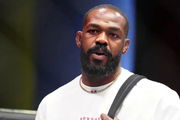

Joe Rogan rarely sounds uneasy on his own show, but his newest JRE episode with actress Katee Sackhoff took an unexpected turn. What began as a lighthearted discussion about the rate of AI advancement devolved into a moment of raw honesty, with the JRE host admitting that he is concerned that artificial intelligence would one day take his job as a UFC commentator and podcaster.
Watch What’s Trending Now!
This time, it wasn’t about competing with other commentators or podcasters; it was about the looming shadow of robots capable of learning his voice, tone, humor, and rhythm — and maybe even improving on it. The UFC commentator, who has made a career on real, unscripted discussions, did not shy away from facing the difficult truth: AI might soon replicate even that.
ADVERTISEMENT
AI podcasting and live commentary — Rogan’s latest fear
The veteran fight commentator admitted on JRE #2400 that he’s “certain there’s going to be AI comedians and podcasters,” as well as “probably AI UFC commentators that do a better job than me.” Sackhoff, intrigued but equally worried, pointed out that there is already “an AI podcast creator right now that’s pumping out podcasts,” to which Rogan could only nod in agreement.
That’s when he dropped a bombshell: “I know that there’s a podcast of me and Steve Jobs, and I never met Steve Jobs,” Rogan claimed. “There’s a whole podcast of me having a conversation with Steve Jobs. It’s AI. AI created the conversation.” The unnerving reality of such creations, a complete episode of Joe Rogan conversing with someone who’s been dead for over a decade, shows how far generative audio and synthetic personalities have come.
Sackhoff added another layer of anxiety by describing how artificial intelligence can now build hyper-specific shows based on individual user cues, transforming even the most ordinary human curiosity into personalized long-form content. Joe Rogan‘s tone moved from curiosity to concern as the implications sank in. “That’s actually positive,” he told the actress.
ADVERTISEMENT

Imago
MMA: UFC 300-Weigh Ins Apr 12, 2024 Las Vegas, Nevada, USA UFC announcer Joe Rogan during ceremonial weigh ins for UFC 300 at MGM Grand Garden Arena. Las Vegas MGM Grand Garden Arena Nevada USA, EDITORIAL USE ONLY PUBLICATIONxINxGERxSUIxAUTxONLY Copyright: xMarkxJ.xRebilasx 20240412_mjr_su5_070
He further added, “But the negative thing is you’re going to have fake humans with fake lived experiences that resonate with you and are impactful.” The anxiety was no longer about job security but about authenticity. In an age when simulated personalities may form emotional relationships with real people, the distinction between what is human and what is artificial is blurring more quickly than ever. However, it is worth noting that this isn’t the first time that Rogan has delved into humanity’s relationship with technology.
ADVERTISEMENT
Humans are to be the last “pure” generation, as per Joe Rogan’s podcast
Earlier this month, Joe Rogan and Gregg Braden discussed the future of humanity in the age of artificial intelligence. Braden warned that people are being driven to “embrace technology outside of our bodies” and that our age may be the last completely “pure” humans. He cited the transhuman movement, which predicts that hybrid humans with embedded chips or chemicals may soon become common.
Top Stories
Ex-UFC Champion Shares Emotional Update Before Cancer Surgery Ahead of Title Fight

Sean O’Malley Receives Unexpected UFC White House Callout Amid Petr Yan Title Fight Uncertainty

Dana White Gets Two Unexpected Saviors for UFC Mexico After Main Event Cancellation

Jon Jones’ “Severe” Medical Update Ends Daniel Cormier RAF Match, Puts UFC White House Plans in Jeopardy

Team Khabib Star Brutally Trolls Paddy Pimblett and Justin Gaethje Over UFC 324 Main Event

Braden stressed that the transhuman movement is already underway, and Joe Rogan highlighted how it extends beyond AI to other aspects of life. By 2032, he explained, people we encounter daily may have technology integrated into their bodies, radically redefining what it means to be human. This transition poses cultural, ethical, and existential concerns, compelling society to consider the trade-off between advancement and preserving authentic human experience.
ADVERTISEMENT
The discussion also touched on AI’s broader societal role, with Joe Rogan speculating that intelligent machines could one day make decisions in government or leadership, outpacing human judgment. Rogan sees this as a grim reality: while AI and technology are transforming the world, our actions today will determine whether humanity preserves its “pure” identity or becomes part of a hybrid future.
ADVERTISEMENT
ADVERTISEMENT
ADVERTISEMENT